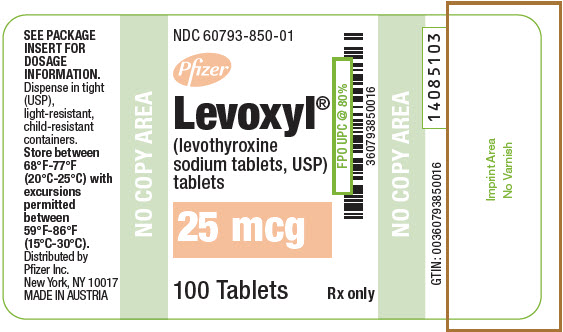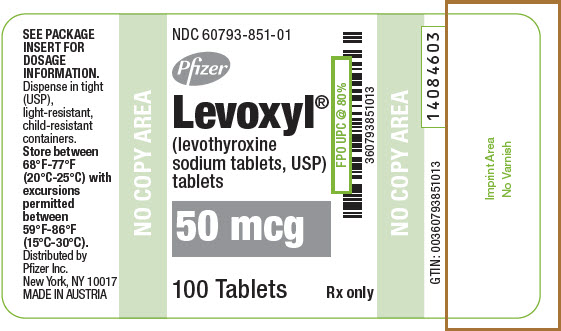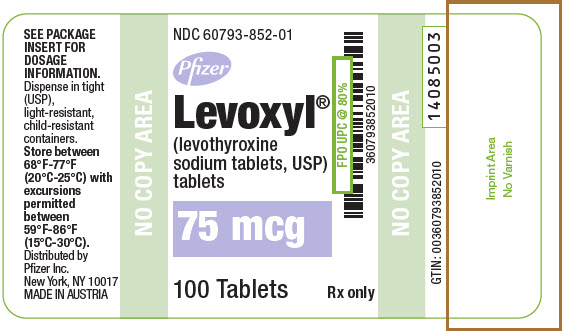Levoxyl
Generic name: levothyroxine
Drug class: Thyroid drugs
Medically reviewed by A Ras MD.
What is Levoxyl?
Levoxyl is a prescription medicine that contains a hormone called levothyroxine, which is similar to the hormone produced by your thyroid gland. Levoxyl is used to treat children and adults to replace or give extra levothyroxine in people whose thyroid does not produce enough of this hormone. It is also used in patients who need surgery and radioiodine therapy to manage a type of thyroid cancer called well-differentiated thyroid cancer.
Levoxyl should not be used to treat people who are recovering from swelling of the thyroid gland (thyroiditis) and whose bodies do not produce enough levothyroxine for a short time.
Description
LEVOXYL contains the active ingredient, levothyroxine, asynthetic crystalline levothyroxine (T4) in sodium salt form. It is chemically designated as L-3,3′,5,5′-tetraiodothyronine monosodium hydrate. Synthetic T4 is identical in chemical structure to the T4 produced in the human thyroid gland. Levothyroxine sodium has an empirical formula of C15H10I4N NaO4 ∙ H2O, molecular weight of 798.85 g/mol (anhydrous), and structural formula as shown:

LEVOXYL tablets for oral administration are supplied in the following strengths: 25 mcg, 50 mcg, 75 mcg, 88 mcg, 100 mcg, 112 mcg, 125 mcg, 137 mcg, 150 mcg, 175 mcg, and 200 mcg.
Mechanism of Action
Thyroid hormones exert their physiologic actions through control of DNA transcription and protein synthesis. Triiodothyronine (T3) and L-thyroxine (T4) diffuse into the cell nucleus and bind to thyroid receptor proteins attached to DNA. This hormone nuclear receptor complex activates gene transcription and synthesis of messenger RNA and cytoplasmic proteins.
The physiological actions of thyroid hormones are produced predominantly by T3, the majority of which (approximately 80%) is derived from T4 by deiodination in peripheral tissues.
What is the most important information I should know about Levoxyl?
- Do not use Levoxyl to treat weight problems or weight loss.
- Do not take more Levoxyl than your healthcare provider prescribes for you to take. Over dosage or taking too much Levoxyl may cause life-threatening side effects or death.
Who should not take Levoxyl?
Do not use Levoxyl if your adrenal glands are not working well and you have not been treated for this problem.
What should I tell my healthcare provider before taking Levoxyl?
Before you take Levoxyl, tell your healthcare provider about all of your medical conditions, including if you:
- have or had heart problems.
- have or had thyroid nodules.
- have adrenal or pituitary gland problems.
- have any food or drug allergies.
- have a low red blood cell count (anemia).
- have diabetes.
- have weak bones (osteoporosis).
- have or had a history of blood clotting problems.
- have recently received radiation therapy with iodine (such as I-131).
- are pregnant or plan to become pregnant. Your healthcare provider may need to increase your Levoxyl while you are pregnant.
Tell your healthcare provider about all the medicines you take, including prescription and over-the-counter medicines, vitamins and herbal supplements. Levoxyl may affect the way other medicines work, and other medicines may affect how Levoxyl works. You can ask your healthcare provider or pharmacist for a list of medicines that interact with Levoxyl.
Tell every healthcare provider including your dentist who treats you that you are taking Levoxyl before any surgery.
How should I take Levoxyl?
- Take Levoxyl exactly as your healthcare provider tells you to take it.
- Your healthcare provider will tell you how much Levoxyl to take each day.
- Take your dose of Levoxyl on an empty stomach, at least 30 minutes to 1 hour before breakfast with a full glass of water to avoid choking or gagging.
- Giving Levoxyl to infants and children who cannot swallow tablets:
- Crush the tablet.
- Place the freshly crushed tablet in a small amount (5 mL to 10 mL or 1 teaspoon to 2 teaspoons) of water.
- Immediately give the medicine by spoon or dropper.
- Do not store the mixed medicine. Do not give in foods that decrease the absorption of Levoxyl, such as soybean-based infant formula.
- Your healthcare provider may change your dose if needed.
- Certain medicines can interfere with how Levoxyl is absorbed by your body. Take or give Levoxyl:
- at least 4 hours before or after medicines that contain calcium carbonate or iron (ferrous sulfate).
- at least 4 hours before medicines that contain bile acid sequestrants or ion exchange resins.
Know the medicines that you take. Ask your healthcare provider or pharmacist for a list of these medicines, if you are not sure.
- Certain foods and drinks including soybean flour, cotton seed meal, walnuts, grapefruit juice and dietary fiber can affect your treatment and dose of Levoxyl. Talk to your healthcare provider if you eat or drink these foods.
- Your healthcare provider should do certain blood tests while you are taking Levoxyl and may change your daily dose of Levoxyl as needed. You should not stop taking Levoxyl or change your dose unless your healthcare provider tells you to.
- It may take weeks before you notice your symptoms getting better. Keep using this medicine even if you feel well.
- You may have to take medicine for the rest of your life to replace the thyroid hormone your body cannot produce.
- If you take too much Levoxyl or overdose, call your healthcare provider or poison control center at 1-800-222-1222, or go to the nearest hospital emergency room right away.
What are the possible side effects of Levoxyl?
Levoxyl can cause serious side effects, including:
- heart problems. You may experience an increased heart rate, chest pain and irregular heartbeat. Your risk of developing heart problems may be greater if you are elderly, have heart problems, or if you take too much Levoxyl. Your healthcare provider may reduce your dose or stop treatment with Levoxyl for a while if you develop heart problems.
- worsening diabetic control. If you are a diabetic, it may be harder to control your blood sugar levels causing hyperglycemia while taking Levoxyl. Check your blood sugar levels closely after starting, changing, or stopping treatment with Levoxyl, and tell your healthcare provider if there are any changes. Your healthcare provider may have to change your diabetes treatment plan.
- weak or brittle bones. Your risk of developing weak or brittle bones may be greater if you are post-menopausal and are taking high doses of Levoxyl for a long period.
The most common side effects of Levoxyl include:
- irregular heartbeat
- chest pain
- shortness of breath
- leg cramps
- headache
- nervousness
- irritability
- sleep problems (insomnia)
- tremors
- muscle weakness
- change in appetite
- weight loss
- vomiting
- diarrhea
- sweating a lot
- heat intolerance
- fever
- changes in menstrual period
Other side effects may include:
- partial hair loss during the first months of treatment with Levoxyl. This usually lasts a short period of time.
These are not all the possible side effects of Levoxyl. Call your doctor for medical advice about side effects. You may report side effects to FDA at 1-800-FDA-1088.
General information about the safe and effective use of Levoxyl
Medicines are sometimes prescribed for purposes other than those listed in a Patient Information leaflet. Do not use Levoxyl for a condition for which it was not prescribed. Do not give your Levoxyl to other people, even if they have the same symptoms that you have. It may harm them.
You can ask your healthcare provider or pharmacist for information about Levoxyl that was written for health professionals.
How should I store Levoxyl?
- Store Levoxyl at room temperature between 68°F to 77°F (20°C to 25°C).
- Store Levoxyl away from heat, light and moisture.
- Keep Levoxyl and all other medicines out of the reach of children.
What are the ingredients in Levoxyl?
Active ingredient: levothyroxine sodium
Inactive ingredients: microcrystalline cellulose, croscarmellose sodium, magnesium stearate, calcium sulfate dihydrate, sodium bicarbonate, coloring additives.
Gluten content: This product is gluten-free.
Label
PRINCIPAL DISPLAY PANEL – 25 MCG TABLET BOTTLE LABEL
- NDC 60793-850-01
- Pfizer
- Levoxyl®
(levothyroxine
sodium tablets, USP)
tablets - 25 mcg
- 100 Tablets
Rx only


PRINCIPAL DISPLAY PANEL – 50 MCG TABLET BOTTLE LABEL
- NDC 60793-851-01
- Pfizer
- Levoxyl®
(levothyroxine
sodium tablets, USP)
tablets - 50 mcg
- 100 Tablets
Rx only


PRINCIPAL DISPLAY PANEL – 75 MCG TABLET BOTTLE LABEL
- NDC 60793-852-01
- Pfizer
- Levoxyl®
(levothyroxine
sodium tablets, USP)
tablets - 75 mcg
- 100 Tablets
Rx only


SRC: NLM .